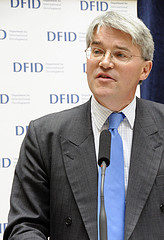Philip Amis is a specialist in urban poverty and institutional reform.
Here at the University of Birmingham we feel we have been part of the recent UK election. The University’s Great Hall, which former students will remember as a venue for sitting exams and for graduation ceremonies, was transformed into a television studio for the third live election debate amongst the party leaders, and for a few days the University was overwhelmed by the world’s media. However, international development was rarely referred to during the campaign. What will the new government mean for UK aid policy?
 Photo courtesy University of Birmingham
Photo courtesy University of Birmingham
Reporters in the media centre on campus watch the Prime Ministerial debate
DFID (and the UK’s aid programme) has been one of the unsung but significant achievements of the New Labour administration (1997-2010). It has become a well respected and admired development agency and is highly rated for its effectiveness and technical competence. I have to admit that I used to be sceptical about DFID but I have been told enough times by other donors (such as the World Bank, UN-HABITAT, and other European development agencies) how “it is the best agency in town” that I have accepted that such praise is deserved. DFID’s reputation has been built on good leadership and on the technical competence of its staff – an issue we shall return to below.
DFID has been led by a succession of highly effective and committed Secretaries of State: Claire Short, Hilary Benn and Douglas Alexander. I should like to formally acknowledge their contributions to this success story. The past Secretaries have all been engaged with the UK public and have on at least five occasions come to Birmingham to discuss development issues with IDD staff and students. Senior politicians debating with students on development is an impressive example of participatory democracy.
 Photo courtesy of DFID
Photo courtesy of DFID
Andrew Mitchell MP, Secretary of State for International Development
So what of the future? The coalition agreement between the Conservative and the Liberal Democrats states: “The target of spending 0.7% of GNI on overseas aid will also remain in place.” This is a very welcome commitment and, given the state of public finances, should be roundly applauded. Andrew Mitchell has been appointed as the new Secretary of State; he comes from the Midlands region and has visited the University at least twice in the last few years. In our discussions he has made clear the importance of independent evaluation to show that UK aid represents good value for money and is addressing poverty, both important to maintain public support for the aid programme.
Can this commitment be sustained? In terms of UK government expenditure and the deficit problem that the UK faces, these are relatively small sums. However, all UK expenditures will come under pressure in the immediate future. My suspicion is that the aid budget may come under pressure from a range of sources – or to put it more specifically to redefine things as “aid” which might previously have come under other headings. These might include spending on the private sector (encouraging UK exports), climate change and the military. All of these are very close to “aid”; should preparing the ground for a school in Afghanistan be paid for out of the MoD (Defence) budget or by DFID? If one wanted to maintain the aid spend it might be tempting, in the current circumstances, to include more in this category.
My final reflection concerns the quality of the aid programme. DFID’s last white paper issued by the outgoing Government emphasised the range of areas in which it will work (climate change, poverty, governance), new modalities (budget and sector support) and a commitment to work in fragile states (it is intended that this will account for 50% of DFID’s spend). Furthermore DFID has a commitment to deliver more with less staff (“headcount” in DFID terminology). The problem with this (and it has been frequently noted to me by DFID staff in private) is that this will undermine the competence and effectiveness of the aid programme.
In a review of DFID’s evaluation methodologies that I did two years ago this was noted in three out of the four Country Evaluation reports that I read. The effectiveness and the success noted above is dependent upon DFID staff and their technical competence; there is a limit to how much you can reduce staff numbers without seriously affecting the effectiveness of the aid programme. This trade off becomes even more acute in fragile states (where DFID aims to focus its attention) where projects and programmes are more reliant on technical inputs given the nature of these places and the complexity of the issues. There is a danger that the well founded reputation of DFID could be undermined in the future by this restriction on the headcount.
My suggestion for the new government is that DFID should consider its overall spend with due attention to expenditure on technical support (people) so that they are at an appropriate level to maintain the effectiveness of the aid programme. This is important given the attention of the new administration to show that aid works and is good value for money. Failure to do this could, given the present austerity environment and the nature of some of the political supporters in the new coalition, ultimately undermine the legitimacy of aid from the UK. This would be an enormous and unnecessary mistake.
